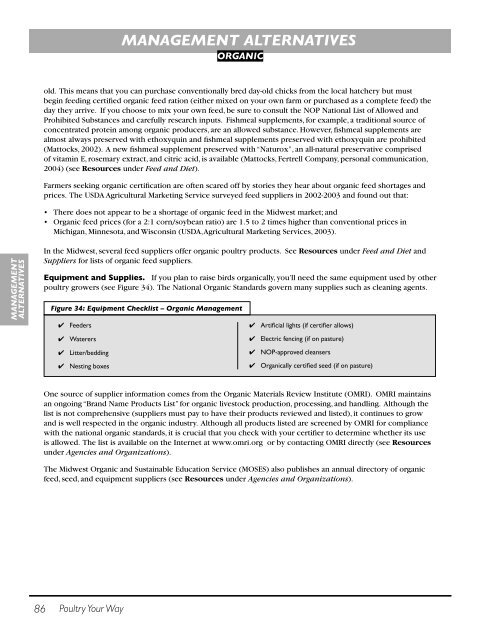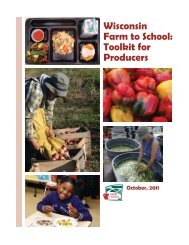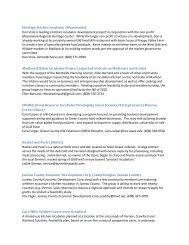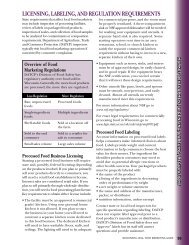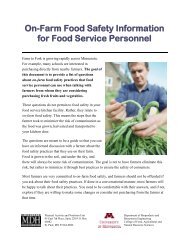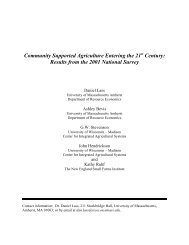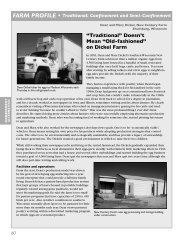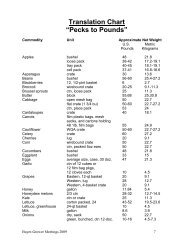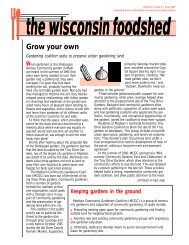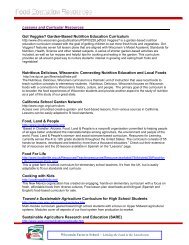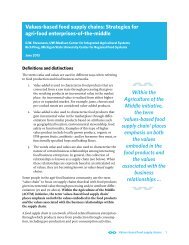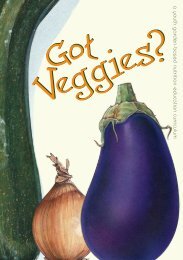Poultry Your Way - Center for Integrated Agricultural Systems ...
Poultry Your Way - Center for Integrated Agricultural Systems ...
Poultry Your Way - Center for Integrated Agricultural Systems ...
Create successful ePaper yourself
Turn your PDF publications into a flip-book with our unique Google optimized e-Paper software.
MANAGEMENT<br />
ALTERNATIVES<br />
86<br />
<strong>Poultry</strong> <strong>Your</strong> <strong>Way</strong><br />
MANAGEMENT ALTERNATIVES<br />
ORGANIC<br />
old. This means that you can purchase conventionally bred day-old chicks from the local hatchery but must<br />
begin feeding certified organic feed ration (either mixed on your own farm or purchased as a complete feed) the<br />
day they arrive. If you choose to mix your own feed, be sure to consult the NOP National List of Allowed and<br />
Prohibited Substances and carefully research inputs. Fishmeal supplements, <strong>for</strong> example, a traditional source of<br />
concentrated protein among organic producers, are an allowed substance. However, fishmeal supplements are<br />
almost always preserved with ethoxyquin and fishmeal supplements preserved with ethoxyquin are prohibited<br />
(Mattocks, 2002). A new fishmeal supplement preserved with “Naturox”, an all-natural preservative comprised<br />
of vitamin E, rosemary extract, and citric acid, is available (Mattocks, Fertrell Company, personal communication,<br />
2004) (see Resources under Feed and Diet).<br />
Farmers seeking organic certification are often scared off by stories they hear about organic feed shortages and<br />
prices. The USDA <strong>Agricultural</strong> Marketing Service surveyed feed suppliers in 2002-2003 and found out that:<br />
• There does not appear to be a shortage of organic feed in the Midwest market; and<br />
• Organic feed prices (<strong>for</strong> a 2:1 corn/soybean ratio) are 1.5 to 2 times higher than conventional prices in<br />
Michigan, Minnesota, and Wisconsin (USDA, <strong>Agricultural</strong> Marketing Services, 2003).<br />
In the Midwest, several feed suppliers offer organic poultry products. See Resources under Feed and Diet and<br />
Suppliers <strong>for</strong> lists of organic feed suppliers.<br />
Equipment and Supplies. If you plan to raise birds organically, you’ll need the same equipment used by other<br />
poultry growers (see Figure 34). The National Organic Standards govern many supplies such as cleaning agents.<br />
Figure 34: Equipment Checklist – Organic Management<br />
✔ Feeders<br />
✔ Waterers<br />
✔ Litter/bedding<br />
✔ Nesting boxes<br />
✔ Artificial lights (if certifier allows)<br />
✔ Electric fencing (if on pasture)<br />
✔ NOP-approved cleansers<br />
✔ Organically certified seed (if on pasture)<br />
One source of supplier in<strong>for</strong>mation comes from the Organic Materials Review Institute (OMRI). OMRI maintains<br />
an ongoing “Brand Name Products List” <strong>for</strong> organic livestock production, processing, and handling. Although the<br />
list is not comprehensive (suppliers must pay to have their products reviewed and listed), it continues to grow<br />
and is well respected in the organic industry. Although all products listed are screened by OMRI <strong>for</strong> compliance<br />
with the national organic standards, it is crucial that you check with your certifier to determine whether its use<br />
is allowed. The list is available on the Internet at www.omri.org or by contacting OMRI directly (see Resources<br />
under Agencies and Organizations).<br />
The Midwest Organic and Sustainable Education Service (MOSES) also publishes an annual directory of organic<br />
feed, seed, and equipment suppliers (see Resources under Agencies and Organizations).


